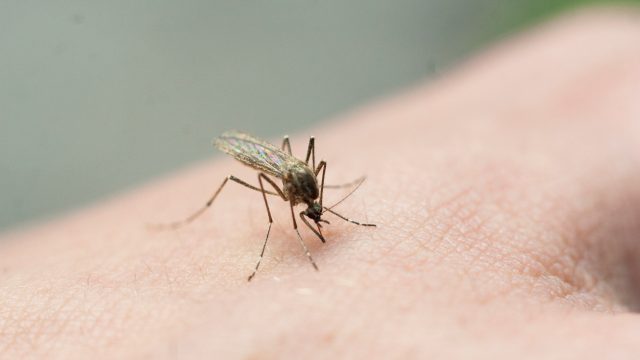West Nile Cases Are on the Rise—5 Symptoms to Know

Concerns about a potential COVID outbreak amidst the ongoing bird flu surge have been top of mind this summer—and now, health officials say West Nile cases are also on the rise. The West Nile virus, which is transmitted through contact with infected mosquitos, has been reported in 26 states as of Aug. 6, per the Centers for Disease Control and Prevention (CDC). Infection levels haven’t been this high since the 2012 outbreak, which could indicate that the U.S. is “due for another one,” infectious disease specialist Kristy O. Murray, DVM, PhD, said in an Aug. 12 interview with Scientific American.
RELATED: 38-Year-Old Shares “Really Weird” Lymphoma Symptoms He Dismissed.
The mosquito-borne disease was first detected in the U.S. in 1999. Since then, more than 51,1000 cases have been reported, with the most occurring between 2002 and 2003 and again in 2012. It’s been over a decade since the West Nile virus violently struck the U.S., and experts like Murray believe our time has come for another outbreak.
“In the beginning, 2002 and 2003 were really big years. We had another big outbreak year in 2012, and then I figure we’re kind of due for another one at this point,” Murray told Scientific American.
There isn’t a way to outrun or sidestep the mosquito disease either, added disease ecologist Gonzalo Vazquez-Prokopec, PhD. In fact, it’s here to say indefinitely. “West Nile has become established in the U.S. We have to live with West Nile,” he reasoned.
As of Aug. 6, 103 cases have been detected in 26 states, including California, Arizona, North Dakota, South Dakota, Minnesota, Kansas, Oklahoma, Michigan, Arkansas, Illinois, Missouri, Tennessee, Indiana, Maine, Pennsylvania, New Jersey, Maryland, Virginia, and North Carolina, per the CDC’s 2024 West Nile data tracker. However, the biggest spike in positive West Nile human cases is currently happening in Texas, Nevada, Nebraska, Louisiana, and Mississippi.
According to the Cleveland Clinic, West Nile spreads through mosquitoes that have been infected with the virus via contact with sick or dead infected birds. The virus “multiplies inside the mosquito” and is passed onto humans when bitten. Outside of very rare cases (i.e. through organ transplantation, blood transfusions, or from mother to fetus), West Nile isn’t spread from human to human.
The good news is most people who do come in contact with West Nile don’t experience any symptoms. And if they do, symptoms closely resemble those you may get with a harsh cold or mild case of the flu.
RELATED: Listeria Outbreak Tied to Deli Meat Spreading in 12 States—These Are the Symptoms.
Cleveland Clinic reports that humans may experience West Nile symptoms within two to six days after being bitten by an infected mosquito. One in five people will have a fever, headache, and body aches, plus swollen lymph nodes and occasional nausea and vomiting. A stiff neck can also occur, and Murray noted that the headache from West Nile can be particularly painful.
“They’ll say it’s the worst headache they’ve had in their entire life,” she told Scientific American.
While these are the most common signs of West Nile illness, diarrhea, rash, joint pain, sore throat, and pain behind the eyes have also been reported. In healthy people, mild symptoms resolve on their own within a few weeks. However, in some people, the infection can become neuroinvasive.
Essentially, “neuroinvasive” means the infection has infiltrated the brain or spinal cord, leading to encephalitis or meningitis. About one in 150 people will develop a neuroinvasive infection due to West Nile, per Scientific American. This can result in long-term effects, including memory loss, hearing loss, muscle weakness, depression, difficulty walking, and abnormal reflexes, per Cleveland Clinic.
“Our meningitis cases, about 40 percent of them never returned back to their baseline status, and for our encephalitis cases, [that figure] was 80 percent,” said Murray.
Neuroinvasive disease is extremely rare but can occur in anyone regardless of age or health status.
“Most people do not get neuroinvasive disease,” Robyn S. Klein, MD, PhD, a physician and neuroimmunologist at Western University in Ontario, told Scientific American. “It’s unclear exactly why some people get invasive disease.”
RELATED: The Small Symptoms People “Never Think of as COVID,” Doctors Share.
If you are worried you may have West Nile, Cleveland Clinic recommends speaking with your healthcare provider. The virus is diagnosed via a blood or cerebrospinal fluid test, but that generally only occurs in people who are seriously ill.
Currently, there aren’t any antiviral treatments for West Nile virus, but symptoms of mild cases can be treated with over-the-counter medications. More serious neurological symptoms will require medical attention.
To avoid contracting West Nile, Cleveland Clinic recommends staying inside when mosquitoes are most active (early morning and sunset), using insect repellent, keeping your skin covered, draining standing water that may become breeding grounds for mosquitoes, and keeping doors and windows screened or closed.
- Source: CDC: 2024 West Nile Data Tracker
- Source: Cleveland Clinic: West Nile Virus